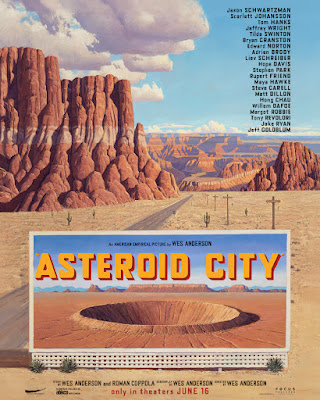Review | Asteroid City | 2023
There's something inherently refreshing about watching a movie with actual color in the midst of an ongoing Hollywood trend of releasing movies that look like they were filmed through a layer of mud on the camera lens, because the vibrant colors of Wes Anderson's Asteroid City with their washed-out blue tint feel almost revelatory.
If anything, the oversaturated color palate forms a kind of counterpoint to one of Anderson's most muted works, a kind of wistful fable about a group of emotionally distant and wounded people who converge on a tiny desert town in the 1950s for a Junior Stargazer convention, where a fateful encounter with an alien (Jeff Goldblum) will reframe their lives in unexpected ways.The film is framed as a play within a TV show within a movie, in which Brian Cranston hosts a behind-the-scenes program about a group of actors putting on a new play by famed playwright Conrad Earp (Edward Norton) about a fictional Western town called Asteroid City, a desolate place whose only claim to fame is a small meteorite crater. Nothing else much happens here, other than the occasional high speed chase or atomic bomb test, so when grieving father Augie Steenbeck (Jason Schwartzman) arrives with his four children in tow, the desolate surroundings seem to reflect his emotional state.
Disaffected loners are certainly an Anderson speciality, but in Asteroid City he seems to take that sense of emotional alienation to the next level. It is, perhaps, one of his most insular works, but in its own way, it's also one of his most immediately relatable. The film is ultimately about a group of people bonded by the shared trauma of quarantine, their sense of grief and loneliness from prior loss suddenly feeling more manageable in the face of cataclysmic, life altering events. It certainly has that trademark Anderson wit, but everything seems more dialed back and reflective here. Even Alexandre Desplat's score is relegated to some subtle twinkling that slowly reveals the magic of human connection that the characters uncover.
Filmed through so many layers of meta textual artifice, the emotions of Asteroid City may feel a little too distant and opaque for some. But Anderson's tightly controlled snow globe aesthetic is vital to the world his characters inhabit, and there's something deeply cathartic about watching them navigate those layers in order to find nuggets of emotional truths about themselves and each other. It's a lovely, warm, heartfelt work that won't likely win over any converts to those who find Anderson's style anathema, but for those who don't, Asteroid City feels like a balm for a wounded heart.





Comments